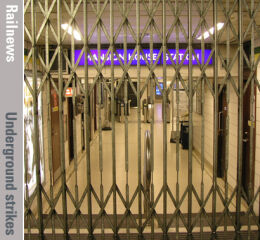Posted 4th September 2025
Underground peace talks fail, and strikes are still on

Time is running out for any chance of averting next week’s disruptive London Underground strikes, which have been called by the RMT in its dispute with Transport for London over pay, hours and conditions.
Talks to end the dispute failed yesterday, but TfL has remained adamant that it cannot afford to reduce the Underground working week from 35 to 32 hours, which would ‘cost tens of millions’.
At the moment, various groups of staff are set to walk out on different days starting on Sunday. They include track access controllers, who will walk out all day on 7 September, while signallers will strike on the ninth and again on the eleventh.
TfL said the Underground will be ‘severely disrupted, with little to no service expected’ from Monday to Thursday. There will also be no Docklands Light Railway trains on Tuesday and Thursday because of a separate dispute, but the DLR should run normally on other days.
The Elizabeth Line and London Overground are not involved, but at times their trains will not be able to stop at stations which are managed by London Underground.
TfL has written to 16,500 Underground staff, explaining that it would rather use its budget to increase pay rather than reducing working hours. However, a four day week is to be tried on the Bakerloo Line, but drivers would still be working 35 hours in total.
It is reported that disruption is looking inevitable unless the strikes are called off by tomorrow night.
Disruption will also affect National Rail services from London Marylebone to Aylesbury via Amersham, because Chiltern Railways services run on LUL infrastructure north of Harrow-on-the-Hill.
On most days trains will run to London, but they will not serve stations south of Great Missenden. However, when LUL signallers strike, on Tuesday and Thursday, Chiltern trains from Aylesbury will terminate at Great Missenden.
Last night London Underground customer operations director Nick Dent told staff: ‘We continue to believe our pay budget is best spent increasing colleagues’ pay. This is what colleagues want, preferred over other costly items in the TUs’ pay claims such as a reduction in contractual hours.’
He added that fatigue and the effects of ‘extreme shifts’, which are also part of the dispute, is are already being addressed. He continued: ‘We’re serious about addressing fatigue. We take fatigue management extremely seriously and have put in place a range of measures to reduce it.
‘Today with the RMT we discussed other ways this can be achieved. However, RMT have maintained they will only accept measures that include a reduction in contractual hours, including for those that do not work shifts.
‘This cannot be delivered – the costs are huge, unsustainable and will not effectively address the issue of fatigue.’
TfL chief operating officer Claire Mann urged the RMT to call off the strikes and arrange a new ballot about a 3.4 per cent pay offer, which had only been made after the previous ballot had started.
The RMT has not commented on the latest developments, but when the strikes were announced on 21 August, general secretary Eddie Dempsey had said: ‘Our members are doing a fantastic job to keep our capital moving and work strenuous shift patterns to make sure Londoners get to their destinations around the clock.
‘They are not after a King's ransom, but fatigue and extreme shift rotations are serious issues impacting on our members health and wellbeing- all of which have not been adequately addressed for years by LU management.
‘Coupled with the fact there are outstanding issues around staff travel arrangements, an atmosphere of distrust has been created, where our members feel like no one is listening to them.’
What do you think? Click here to let us know.
